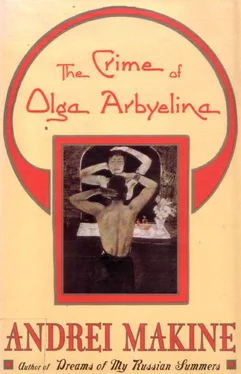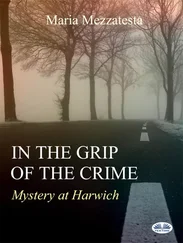He stopped at the silvery and black frontier that divided the room. Silvery like the snow outside the window, the bluish transparency on the door, the chair, the carpet. Black like the darkness that hovered around the bed. He took a step. Tricked by the snowy phosphorescence of the night, he put his foot on the hem of the curtain that had just slipped down. Another ring fell. Inaudible at first on the carpet, then suddenly beginning to roll on the bare floorboards with a deafening-paralyzing-clatter.
Several interminable seconds of nonlife went by. The boy frozen in the magnesium brilliance. The woman drawing all the darkness in the room around her body… The curtain ring, following its perfidious trajectory, embarked on a slow, clicking roll. Slowly the circles tightened around a center-around a silence that never seemed to come. In this instant of nonlife cadenced by the turning of the ring in ever decreasing circles, she had time to understand everything. Or rather to be blinded by a blazing connect-the-dots line: the movement of the young stranger surprised at the beginning of the autumn; the reptile; the oil on the door hinges… And even that ruined bridge, the steel girder with a boy advancing along it like a sleepwalker… A shout would have made him fall. As now, in crossing this room…
The curtain ring became still. After another endless minute she saw a long, thin shadow detaching itself against the background of the window whitened by snow. The outline of this apparition was lost in the blue twilight. The branches covered in hoarfrost parted as it passed. The crystals swirled slowly, sprinkling their bodies, melting on their skin. She was experiencing all this on the far side of sleep.
The curtains were carefully drawn, the rings rearranged on the curtain rod. It was the first thing she saw on waking and the last thing she was able to note with any kind of calm. "He must have thought the unhooked curtain was his fault and…"
She threw back the blanket, got up, observed her body beneath the open flaps of her dressing gown as if she had never seen it before. Then turned back toward the bed. The blanket! Someone had thrown it over her bare feet… Someone? She caught herself still hoping for a mistake, a misunderstanding, the mysterious intervention of a "someone."… The stove door was closed-although it had been left slightly open the night before… The whole room was booby-trapped with eloquent objects, incriminating evidence of a presence that did not even have to be proved.
Behind the thick velvet of the curtains a sparkling day could be sensed. The folds of material, although dark, were bursting with warm light and were on the brink of yielding to its dazzling torrent from one minute to the next. Isolated in a dark, ominous silence, the bedroom was about to be flooded by the sun, gutted by sounds… She went to the door and hesitated a long time with her hand on the handle. Beyond the door there could only be a blinding void, vibrant with a shrill, intolerable resonance.
She pushed at the handle. She was struck by the utter banality of the long corridor, its dreary look, the old coatrack, the familiar smell. At the far end the walls were lit up by the shafts of light streaming in from her son's bedroom… She walked toward it, vacantly, wide-eyed, with an unthinking faith-that everything would be resolved, by magic, wordlessly, as soon as their eyes met.
There was nobody in this bedroom, all radiant with sunlight. Nobody and yet he was there-in the crayon serving as a bookmark, in the shirt on the back of a chair… As usual. As yesterday, as in two days' time. The cheerful permanence of things terrified her. And when the tea began to brew in her cup, as it did every day, she walked rapidly out of the kitchen, seized her coat, and left the house.
For if she had simply continued with the petty ritual of habitual actions she would have been transformed into a monstrous being: the woman to whom that had happened. That was yesterday evening, last night. She understood it but still managed to avoid naming it: that.
Everything around her resonated. The rays of the sun, the glittering of the drops of melted snow trickling off the roof of the Caravanserai, the fragments of ice beneath her feet. And amid all this din a single thought ricocheted ceaselessly back and forth from one side of her brain to the other: to leave! At first this saving solution took her breath away by its simplicity. Yes, to leave! Bordeaux, Marseilles… She already saw herself settled in a train, running away from what had just happened to her. Then suddenly this absurd recollection: "Trains to run faster: Bordeaux… Marseilles…" So it was the paragraph glimpsed in a newspaper that had suggested destinations for her escape. Yet how could she go away? Leaving the child with whom? The child?
The drumming resumed in her temples even more forcefully. Yes, she must go away but go away forestalling yesterday evening, foiling it, before that could be given its definitive name. She had a presentiment of a place where the night she had just lived through would no longer appear like a horror and a monstrosity. A place or rather a time that was simultaneously now and yesterday but also a very distant day yet to come. A time where everything would be reconciled, mended, would find its justification. For a brief moment she believed she was breathing the airy serenity of this prefigured time.
Reality returned with a jolt: a passerby kept asking her a question.
"Are you going away?" this woman repeated, surprised at receiving no reply.
It was one of the readers from the library.
"Are you going to Paris?"
"No, why?"
Olga glanced around her. She had set off up one of the streets the occupants of the Caravanserai used to take when going to the station.
"Oh, I see. I thought…"
"No, no, I was just going for a walk…"
She turned into a different street and at once bumped into a whole group of Russians. Then an old couple who lived on the ground floor of the Caravanserai. A few steps farther on, a resident of the old people's home. They all stopped, greeted her, studied her with particular interest, it seemed to her. She no longer knew how to avoid this cavalcade of smiling faces, softened by the glorious sunlight, by the festive brilliance of the snow. The next turning was a blind alley. The baker's was closed. She felt as if she were an animal that could be tracked more easily on the whitened earth. And that their words only seemed to be harmless; their eyes were scrutinizing her. What did they guess? How far could their curiosity reach? Making her way past the whole procession, she finally arrived at its source-the Orthodox chapel. So it was a festival. And their words had indeed been harmless and their eyes had seen through nothing. Plunging into the darkness punctuated with lights, she felt a pleasant relaxation in her body. The chapel was deserted. All she could hear was the invisible presence of an old woman behind a pillar, sighing as she cleaned the floor covered in traces of melted snow and sand. Olga took refuge in the furthermost part and stopped before an icon. She had no prayer to formulate. Simply the desire to curl up in a remote corner away from the light, like an animal that has just been wounded and, not yet feeling pain, is preparing for it to come flooding in. Absently she touched the cracked surface of the icon, stared at the dull, expressionless face of the child, then that of the mother, her astonished eyes with heavy, oriental lids. Suddenly a grotesque detail made her step back a pace: the Virgin in the icon had three arms! Yes, two hands were holding the child and the third, parting the folds of the gown, was poised in a sign of the cross. It was the famous Russian Virgin with three arms…
She spent the afternoon strolling slowly amid the trees that grew behind the Caravanserai. As evening approached the snow stopped melting. The sun became embedded in the branches, turned red. Sounds were distilled in the air with the clarity of isolated notes of music. She was all alone-the only other footmarks on the white surface apart from her own were the arrowhead prints of birds and those of a child, a boy with red hair who was throwing stones onto the sheet of frozen water between the wood and the river. His family had left the Caravanserai the previous spring but with a kind of childish faithfulness the young redhead still returned to his old playground. The little stones he was throwing did not succeed in breaking the ice and sped across the pool from one end to the other with a melodious tinkling.
Читать дальше












